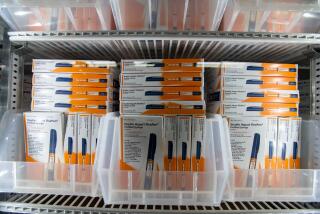AIDS Drug Makers in Talks With S. Africa
- Share via
PRETORIA, South Africa — Pharmaceutical giants entered settlement talks with the government Wednesday, signaling that they are dropping their fight against a law that could provide cheaper versions of AIDS drugs to millions of South Africans.
The firms’ lawsuit, postponed until today as the discussions continued, has deeply embarrassed the drug companies since hearings began six weeks ago. Many of them have responded by drastically cutting prices on their own.
However, human rights groups say those prices would fall even further in the face of generic competition.
An official with one of the pharmaceutical companies said the suit “had largely been resolved” after the South African government reached an agreement with several of the largest companies involved.
Those firms spent much of the day persuading the remainder of the 39 companies involved in the suit to accept the agreement, said the official, who spoke on condition of anonymity.
Only technical issues, including who will pay court costs, remained to be worked out, the official said.
International human rights groups and AIDS activists have waged a global public relations offensive against the suit, which they see as an obstacle to securing medication for the nearly 26 million people in sub-Saharan Africa who have AIDS or HIV, the human immunodeficiency virus that causes AIDS.
The law could give South Africa the power to import or produce generic versions of patented drugs--including expensive antiretroviral drugs needed to treat acquired immune deficiency syndrome. An estimated 4.7 million South Africans are infected with HIV.
As the legal case resumed Wednesday morning after a six-week postponement, Stephanus Cilliers, a lawyer for the drug companies, asked for a four-hour recess “in hopes that certain discussions that are going on will obviate the need for further . . . proceedings.”
When court reconvened at 2 p.m., he was granted a recess until this morning so that discussions could continue.
Health Minister Manto Tshabalala-Msimang declined to comment on the negotiations as she left the courtroom.
More to Read
Sign up for Essential California
The most important California stories and recommendations in your inbox every morning.
You may occasionally receive promotional content from the Los Angeles Times.













